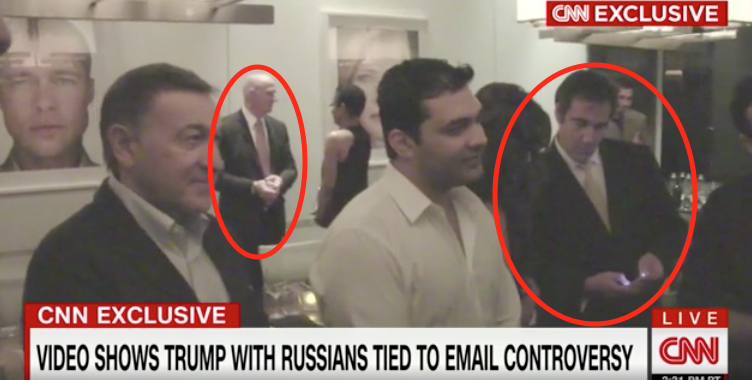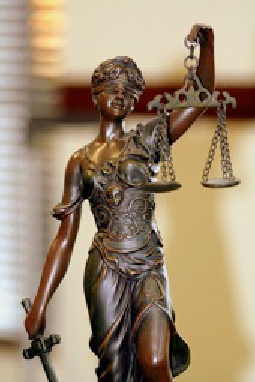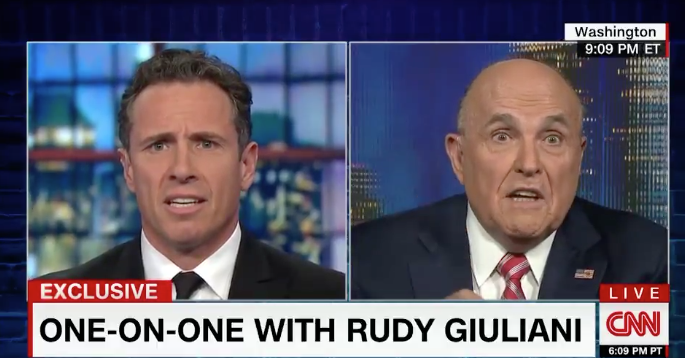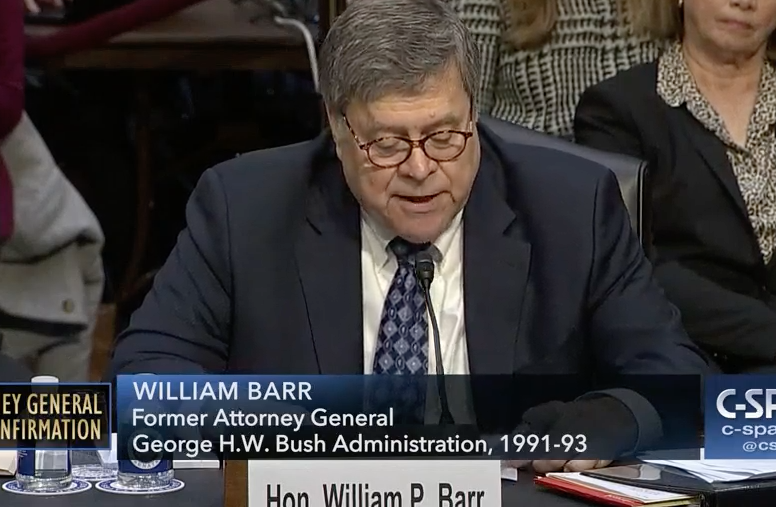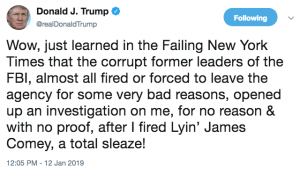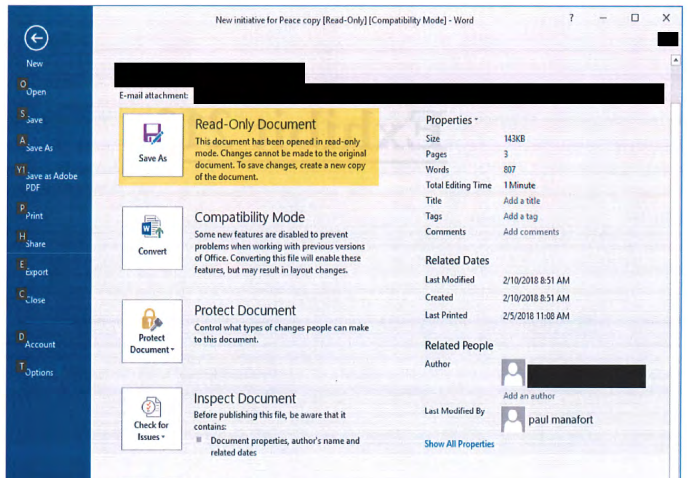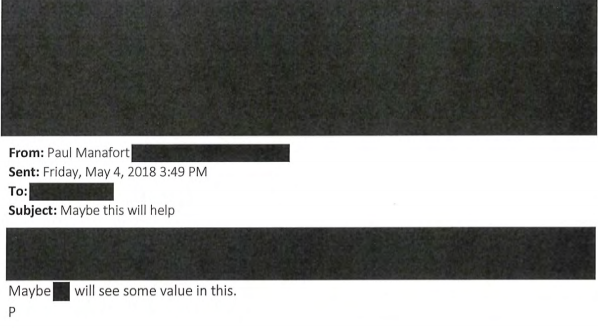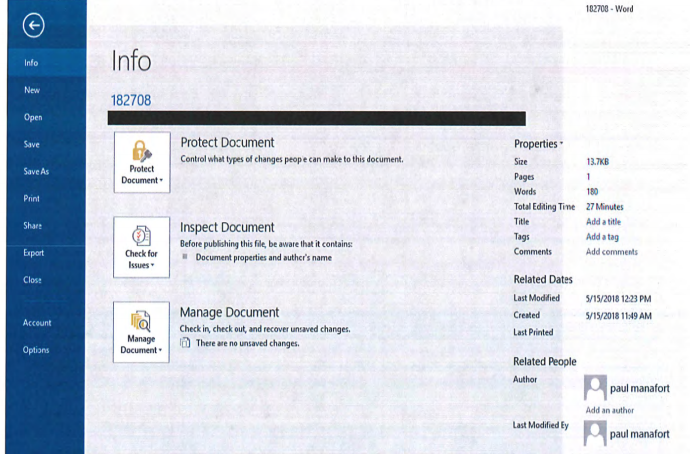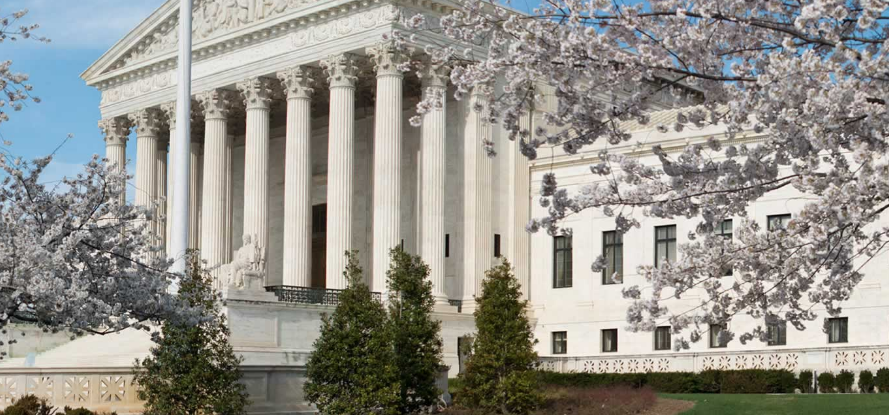Peter Carr Speaks
Yesterday, Mueller’s spox Peter Carr issued a statement vaguely denying Thursday’s Buzzfeed story claiming that Trump ordered Michael Cohen to lie.
BuzzFeed’s description of specific statements to the special counsel’s office, and characterization of documents and testimony obtained by this office, regarding Michael Cohen’s congressional testimony are not accurate.
Clearly, there are parts of the story that are correct, in that they provide specific details that match the vague ones Mueller himself has released.
The new details in the story include a price tag for the Trump Tower detail: Trump, “hoped could bring his company profits in excess of $300 million” (Mueller’s sentencing memorandum stated that the deal might be worth “hundreds of millions of dollars from Russian sources in licensing fees and other revenues”). It quantifies how many times Trump and Cohen spoke about the deal: Trump, “had at least 10 face-to-face meetings with Cohen about the deal during the campaign.” It also confirms that Don Jr and Ivanka were the “family members” described in Cohen’s allocution who were apprised of the details.
That, by itself, suggests that Buzzfeed’s sources have direct access to some of this evidence.
But one thing Mueller is almost certainly responding to is a claim that puts blame for the lies Cohen told to Congress on Trump. Michael Cohen is under oath saying not that Trump ordered him to lie, but that he lied to match the messaging that Trump was using.
By 2017 I was no longer employed in this capacity, but continued to serve on several matters as an attorney to the former CEO of the Trump Organization and now President of the United States, who is referred to as Individual 1 in the information.
As I had in the years before the election, I continued in 2017 to follow the day-to-day political messaging that both Individual 1 and his staff and advisers repeatedly broadcast, and I stayed in close contact with these advisers to Individual 1. As such, I was aware of Individual 1’s repeated disavowals of commercial and political ties between himself and Russia, his repeated statements that investigations of such ties were politically motivated and without evidence, and that any contact with Russian nationals by Individual 1’s campaign or the Trump Organization had all terminated before the Iowa Caucus, which was on February 1 of 2016.
In 2017, I was scheduled to appear before the Senate Select Committee on Intelligence as well as the House Permanent Select Committee on Intelligence concerning matters under their investigation, including principally whether Russia was involved in or interfered in the 2016 campaign and election.
In connection with my appearances, I submitted a written statement to Congress, including, amongst other things, a description of a proposed real estate project in Moscow that I had worked on while I was employed by the Trump Organization.
That description was false — I knew at the time — in that I had asserted that all efforts concerning the project had ceased in January of 2016 when, in fact, they had continued through June of 2016;
That I had very limited discussions with Individual 1 and others in the company concerning the project, when in fact I had more extensive communications; and,
Lastly, that I had never agreed to travel to Russia in connection with the project and had never asked Individual 1 to travel, when in fact I took steps to and had discussions with Individual 1 about travel to Russia.
And I would like to note that I did not in fact travel there, nor have I ever been to Russia.
I made these misstatements to be consistent with Individual 1’s political messaging and out of loyalty to Individual 1. [my emphasis]
That’s a point I made yesterday: Buzzfeed’s story materially differed from the sworn testimony in the case, and even if their sources were right that, in fact, Trump sanctioned Cohen’s lie, they should have explained why Mueller says differently.
Notably, Cohen’s allocution says that he “stayed in close contact with these advisers to Individual 1,” not that he was talking to Trump directly. It’d be hard (though by no means impossible) to have been ordered directly by Trump to lie if he was no longer in day-to-day contact with Trump.
Carr is also seemingly objecting to this characterization:
The special counsel’s office learned about Trump’s directive for Cohen to lie to Congress through interviews with multiple witnesses from the Trump Organization and internal company emails, text messages, and a cache of other documents.
That’s unsurprising. He’s denying that Mueller has documents and Trump Organization (which may be different from White House) witnesses that would make Cohen’s sworn allocution false. In any case, Trump doesn’t use email, so there’s no email where Trump ordered Cohen to lie.
My very strong suspicion is that this happened — and Mueller pushed back — for two reasons.
First, as I noted yesterday, Buzzfeed’s sources appear to have access to primary evidence, but their focal awareness of what Cohen said to Mueller appears to be limited to precisely what Cohen’s sentencing memo had. That is, Buzzfeed didn’t receive any of the details that would be more useful for understanding how the Trump Tower deal relates to any larger conspiracy between Trump and Russia, they received the details that made it into the sentencing memo.
Cohen’s sentencing went through SDNY, where his other guilty plea was, which means SDNY (both the US Attorney’s office and the FBI Field Office) would have visibility on that process. So it’s likely that Buzzfeed’s sources are there, which would be consistent with the two descriptions Buzzfeed provided for their two law enforcement sources.
two federal law enforcement officials involved in an investigation of the matter
law enforcement sources familiar with his testimony to the special counsel
If that’s right, it explains a big part of what happened. As I noted yesterday, there’s a stark difference in the way that Cohen allocuted his hush payments for Trump and the way he allocuted his lies for Trump. Regarding the hush payments, he says he acted at the direction of Trump.
With respect to the conduct charged in these Counts, Michael kept his client contemporaneously informed and acted on his client’s instructions. This is not an excuse, and Michael accepts that he acted wrongfully. Nevertheless, we respectfully request that the Court consider that as personal counsel to Client-1, Michael felt obligated to assist Client-1, on Client-1’s instruction, to attempt to prevent Woman-1 and Woman-2 from disseminating narratives that would adversely affect the Campaign and cause personal embarrassment to Client-1 and his family. [my emphasis]
Regarding the lies to Congress, he says he was just trying to advance Trump’s political messaging.
Michael’s false statements to Congress likewise sprung regrettably from Michael’s effort, as a loyal ally and then-champion of Client-1, to support and advance Client-1’s political messaging. [my emphasis]
Both these statements would have been written in consultation with the prosecutors running the case. So SDNY used a fairly aggressive frame to implicate Trump in the hush payments, whereas Mueller was much more circumspect about Trump’s role.
The difference may, in part, be that when Cohen made those hush payments he was still working directly for Trump, and so was in a position to get a direct order rather than speaking (as he said he was) with Trump’s advisers. But even if both cases basically show Trump making his intentions known and Cohen executing those intentions, there’s a good reason for the asymmetry on the description.
Cohen is not a cooperating witness for SDNY. While they continue to investigate Trump and Trump Organization for campaign finance violations, they’re not relying on Cohen to make that case. They’re relying on immunized testimony from Allen Weisselberg and David Pecker. So SDNY (whether people in the office or FBI Agents assigned to the case) has no incentive to be exacting in their description of the evidence on the Trump Tower deal. They can go big, just like they did in the hush payment allocution.
Cohen is, however, a cooperating witness for Mueller. If and when they make a case that the Trump Tower deal was part of a larger election year conspiracy, they will likely need to be able to call Cohen to the stand and describe the truth of how he kept Trump and Don Jr in the loop on the deal, most notably to explain how it factored into Don Jr’s mindset when he accepted a meeting offering dirt in exchange for sanctions relief. They need Cohen to explain that Don Jr would have understood there was $300 million riding on that meeting.
Everything about how Mueller’s team has handled Cohen attests to that possibility. They didn’t need to charge him with false statements and the charge did not add any prison time to his sentence. They didn’t need to make him publicly explain, under oath, why he lied. But by doing that, they began to rehabilitate Cohen publicly. In spite of Cohen’s significant cooperation, they didn’t offer him a 5K letter at sentencing, meaning he’s still on the hook for cooperation; unlike Mike Flynn, for example, he’s not getting a sentence reduction before he takes the stand. But because of the way they handled it, they can mandate his silence about what he told Mueller, demand that Congress limit the scope of his testimony next month, and dictate any response Cohen made yesterday to the story.
The possibility they’ll put Cohen on the stand is likely one reason why Cohen’s allocution about the Trump Tower lies is so much more modest than the SDNY allocution: Mueller will need to be able to corroborate, with other documentary evidence, everything that Cohen will ultimately testify to. And so while they may have reason to believe Trump approved of the lies being told on his behalf — maybe even ordered people at Trump Organization or his spawn to do what they needed to sustain the lies (which might look to SDNY law enforcement as clear evidence that he was directing the lies) — Mueller is not going to set the bar for proof of Cohen’s statement anywhere further than they need for a possible larger conspiracy case. And they don’t need to prove that Trump had a role in Cohen’s lies. Rather, they need to be able to prove that Cohen kept Trump and Don Jr in the loop on the deal itself.
If all this is right, it — and not the magnitude of any errors in the Buzzfeed story (because there have been a number of other big stories where the errors were clearly just as significant) — explains why Carr issued a statement yesterday. First, to make it very clear that in Mueller’s mind, Cohen’s allocution was honest, that he wasn’t (for example) protecting Trump in taking responsibility for the initial lie. But also, to make sure the bar they very deliberately set for Cohen’s testimony remained precisely where they put it in his plea allocution. The last thing Mueller needs is a juror who thinks that unless they show an email with Trump ordering Cohen to lie, then Cohen’s testimony is false. And by making this unprecedented statement, Mueller will make it harder for any defense attorney to raise the bar on what Mueller needs to prove in this case.
There’s probably another reason why Carr made this statement. I don’t doubt that Mueller hates Jason Leopold and Anthony Cormier for the way they got the financial transfer part of this story when no one else did, and more of the Moscow Tower deal story than others (which seems to be forgotten in the squawking about Buzzfeed’s loneliness on this latest story).
But I suspect Carr took this step, even more, as a message to SDNY and any other Agents working tangents of this case. Because of the way Mueller is spinning off parts of this case, he has less control over some aspects of it, like Cohen’s plea. And in this specific case (again, presuming I’m right about the SDNY sourcing), Buzzfeed’s sources just jeopardized Mueller’s hard-earned reputation, built over 20 months, for not leaking. By emphasizing in his statement what happened in “the special counsel’s office,” “testimony obtained by this office,” Carr strongly suggests that the people who served as sources had nothing to do with the office.
A couple more points. A lot of people are complaining that Carr didn’t more aggressively warn Buzzfeed off the story (though he did provide what sounds like Cohen’s allocution, which — if it had been reviewed by one of Buzzfeed’s superb legal reporters — probably would have led to the cautions I raised yesterday). I get why that would be nice. But I think people really misunderstand the degree to which Mueller knows that every single action they take will eventually be subjected to scrutiny courtesy of a Judicial Watch FOIA. And any hint at all that Carr provided any inkling about the case to journalists will be blown up by Trump and his lawyers.
Finally, the actions Carr took yesterday (and Mueller’s big-footing on Cohen’s testimony before the Oversight Committee next month) only make sense if Cohen might have to play a role in a possible trial, and not a report submitted confidentially to Attorney General William Barr. That’s what more likely explains Carr’s response than anything else: the discrepancy between what Buzzfeed reported and what Cohen allocuted posed a risk to a possible jury trial. And that may explain another reason why Mueller is a lot more modest about Trump’s role in Cohen’s lies than SDNY is.
Trump’s not going to be indicted by Mueller — at least not before he leaves office via election defeat or impeachment. So Mueller’s focus needs to be on the crimes of those he can charge, like Don Jr. That doesn’t rule out that the evidence he’s looking at shows that Trump oversaw a series of coordinated false statements. He did! With Mike Flynn’s lies, Don McGahn’s clean up of Flynn and Jim Comey’s firings, the response to the June 9 meeting, and yes, this Trump Tower deal, nothing explains the coordinated story-telling of multiple Trump flunkies other than Trump’s approval of those lies. It is, frankly, journalistic malpractice that the press hasn’t noted that, especially on the June 9 meeting, the evidence that Trump lied and ordered others to has already been made public. Trump’s tacit (and explicit, with the June 9 statement) approval of serial false statements, to Congress, to the FBI Director, to FBI Agents, and to Mueller, is an impeachable offense. Multiple outlets have gotten solid proof of that, they just haven’t stated the obvious like Buzzfeed did, perhaps in part because they’re relying on White House sources for their reporting.
But Mueller won’t need to allege that for his case in chief, at least not on the issue of the Trump Tower deal. Because the events that matter to Mueller’s case in chief — the events to which Cohen might have to serve as a witness — happened in 2016, not 2017 or 2018. And the guilt that Mueller would need to prove beyond a reasonable doubt if he does indict this conspiracy is not Trump’s guilt — except as an unindicted co-conspirator. It is Don Jr’s guilt.
So outlets that are suggesting that Mueller’s pushback backs off any evidence that Trump committed a crime make no more sense than the original Buzzfeed report (and ignore the actual evidence of how Cohen’s lies evolved, an evolution in which these outlets were active participants). The only thing that explains Carr issuing such an unprecedented statement is if Cohen’s ability to testify on the stand must be preserved.
Robert Mueller has the unenviable task of needing to sustain as much credibility for a bunch of serial liars as possible, starting with Michael Cohen. Buzzfeed’s story — whether generally true or erroneous on details about Trump Organization witnesses or totally wrong — threatened that effort.
And that’s why, I strongly suspect, Peter Carr finally publicly spoke.
As I disclosed last July, I provided information to the FBI on issues related to the Mueller investigation, so I’m going to include disclosure statements on Mueller investigation posts from here on out. I will include the disclosure whether or not the stuff I shared with the FBI pertains to the subject of the post.



